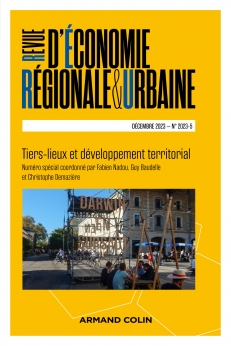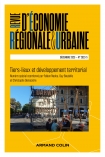
REVUE D'ÉCONOMIE RÉGIONALE ET URBAINE (5/2023)
Pour acheter ce numéro, contactez-nous
Recevez les numéros de l'année en cours et accédez à l'intégralité des articles en ligne.
Concept proposé par Oldenburg (1989), le tiers-lieu est un espace de sociabilité publique hors des cadres familiaux et professionnels. À l’ère d’Internet, sont nommés tiers-lieux des espaces de travail collaboratif (coworking, makerspaces...) initiés par des collectifs locaux d’usagers. Structures émergentes au modèle économique fragile, ces lieux d’innovation économique et/ou sociale ancrés dans leur territoire sont des leviers de développement local. L’article explore l’émergence de politiques – locales, régionales et nationales – en faveur des tiers-lieux. L’analyse multi-scalaire de ces politiques et des réseaux d’acteurs plaide pour une circulation interterritoriale de la notion de tiers-lieu, dont la définition varie selon le type de politique et l’échelle d’action. Alors que s’opposent les valeurs et pratiques des tiers-lieux (ouverture, liberté) et de l’action publique (procédures, contrôle), un cadre de référence socio-technique commun à ces deux mondes émerge de la co-construction d’une politique nationale innovante dans le cadre d’une gouvernance partenariale.
Concept imagined by Oldenburg (1989) to criticize the urban sprawl in the United-States, a third place is defined as a space of sociability outside the framework of the family or the professional settings. Economy is not at the core of these "third places for public life”: the deal is the future of democracy. Twenty years later, the concept of third place designates collaborative spaces where new work practices (coworking, makerspace...) are initiated by local users thanks to digital technologies. This conceptual shift increased when third places became objects of public interest. In France, local, regional and even national policies sustain the spread of third places to transform citizens’ initiatives into collaborative resources for local development and so to reduce territorial inequalities. The article deals with a research question rarely addressed, that is to say the co-production of these policies at different scales. A multi-scalar analysis of these policies and of networks of actors pleads for an inter-territorial circulation of the notion of third place, the definition of which varies according to the type of policy and the scale of action. While the values and practices of third places (openness) and public action (control) oppose each other, a "frame of sociotechnical reference" common to these two worlds emerges from the co-construction of an innovative national policy in the framework of a partnership governance, in contradiction with a State trend to centralization. In France, the enlargement of what is defined by policies as a third place echoes to the definition of Oldenburg: new places where informal public life in a chosen proximity fosters the emergence of social innovations in a transitional era. This political dimension of third places is in contradiction with international academic literature on the economic dimension of collaborative workspaces.

